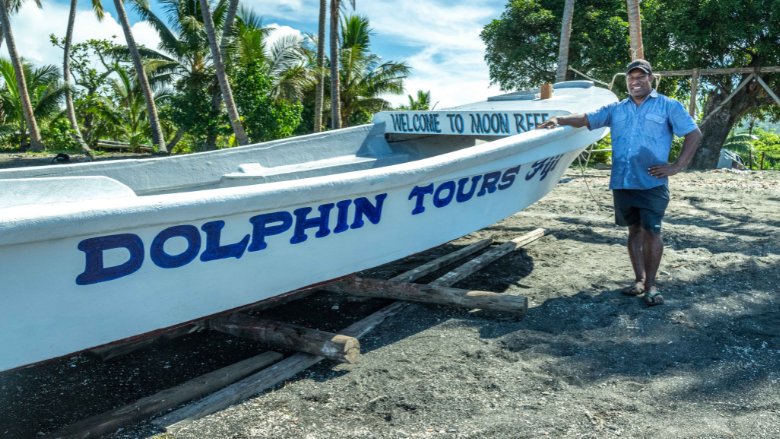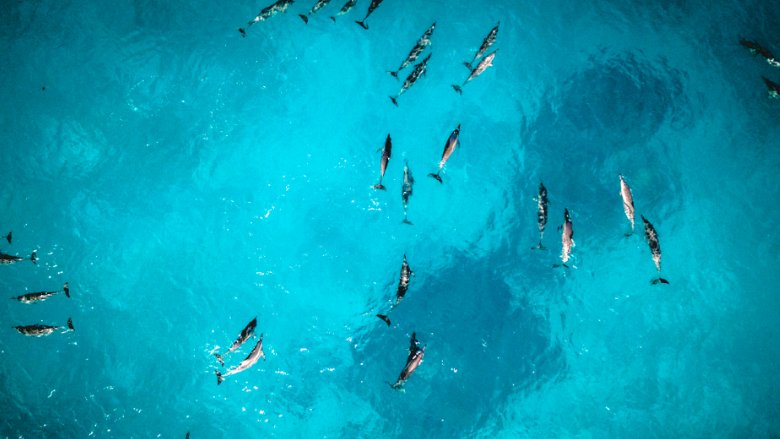Ocean conservation is more than just environmental protection to father of two, Josefa Bau; it is part of his identity.
Josefa Bau from Nataleira runs dolphin watching tours from Natalei eco-lodge in Fiji alongside his wife, Viniana Vuibau. Credit: World Bank/Tom Vierus
Josefa’s love for the ocean started from a very young age, where his father would take him and his siblings out fishing early in the morning, sailing off with breakfast lovingly packed by their mother. Now 45 years old, Josefa runs a dolphin watching business from Natalei Eco Lodge – an hour’s drive northeast of Suva, Fiji’s capital – from where he takes visitors cruising out to emerald blue-green waters that Fiji is world famous for.
Visitors on Josefa’s tours are usually joined by an entourage of anywhere between 60 to 100 spinner dolphins, playfully jumping through the air as Josefa’s tour makes it way out to Makalati reef, also known as Moon Reef because of its crescent moon shape. It is said that these dolphins, known as babale in Fiji’s indigenous i-Taukei (indigenous Fijian) language, are the traditional guardians of the reef.
“It is said that when someone passes away, their spirit is launched from a point on the main island that then dives into the water where the dolphins entertain the spirits until they finally pass on to the afterlife,” explains Josefa.

Makalati Reef or Moon Reef is a marine protected area that is located approximately seven kilometers north of Natalei eco-lodge in Fiji. Credit: World Bank/Tom Vierus
Moon Reef was officially declared a marine protected area in 2010 by the chiefs of Dawasamu, the surrounding district around Josefa’s community. This means that it is now a designated “no-take zone,” where fishing or harvesting of any species from the area is strictly prohibited. For Josefa and his community, the benefits have been significant.
“The dolphin watching business is a boost for tourism in Fiji, and for our local community,” says Josefa. “It helps to bring a lot of revenue to our community and to our schools. We want to make sure our next generation is aware of the importance of preserving our natural resources – from ridge to reef.”
The dividends of this protection have been far-reaching. The income generated from the Moon Reef dolphin tours support community development projects, including many conservation-based activities, marine protection education and awareness as well as supporting infrastructure at the local school. Monitoring and evaluation work – including reporting of any illegal fishing – is also undertaken by community members in the area, and Moon Reef serves as a frequent field research location for students from the University of South Pacific’s Marine Studies program.
Although Fiji’s exclusive economic zone (EEZ) is about 70 times larger than its landmass, Fiji’s terrestrial and marine protected areas only make up one percent of the country. Moon Reef is one of 466 Locally Managed Marine Area communities in all 14 provinces across Fiji. Such marine sanctuaries have been critical in the fight to preserve precious resources, allowing ecosystems to regenerate and thrive. Globally, the World Bank’s Banking on Protected Areas report says that every dollar invested in protected areas and eco-tourism leads to returns at least six-times the size of the initial investment.
According to the International Union for Conservation of Nature (IUCN), Fiji’s marine resources and their services to Fiji’s people are worth more than FJD2.5 billion per year. In Fiji, such benefits are amplified by the fact that traditional knowledge of marine management – which have been practiced by Pacific people for centuries – is being revived, meaning the “old ways” are becoming the ways again.
For example, Fijian i-Taukei belief systems are deeply connected to the ocean, where the people are seen as having the responsibility to nurture and protect their natural resources. This includes the notion of protecting sections of the marine environment – known as tabu (similar to the English; taboo) – meaning an area designated as a “no-take zone” for a period of time, to allow time for the recovery and rejuvenation of its biodiversity.



